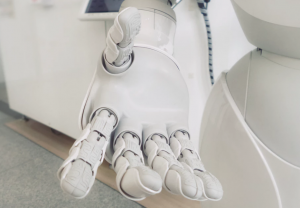written by Adrian Camm
Globalisation and the accelerating rate of technological development provide new and unparalleled opportunities for the evolution of our species. Children entering primary school in 2019 will be young adults in 2030. What will the world look like? What career pathways will be available to them?

Experts argue that the world of 2030 will be shaped by advancements in Artificial Intelligence, Quantum Computing, Synthetic Biology, Biotechnology and the field of Big Data, particularly as the appliances and accessories that we wear and have in our homes gain greater tracking, storage and analytical power through the ubiquity and accessibility of next generation internet services. Automation is already forcing many industries to rethink traditional blue collar professions. The jobs that were once human endeavours are quickly changing as some jobs become obsolete and new jobs are invented.
As Artificial Intelligence applications become increasingly sophisticated, we are seeing glimpses of the inevitability that one day in the not too distant future, machines will exceed our abilities in many, many areas. Intelligent algorithms have even started to exhibit traits like creativity, traits that we once thought would solely exist in the human domain. Even the way we interact with others has changed dramatically. Everything and everyone has at once become more connected through social media and yet more isolated, as “screen time” takes away from much of our face to face communications.
The young people graduating from schools in 2030 will face some of the world’s most pressing and intractable problems: The political, environmental, economic and societal implications of global warming and climate change, the ethics and morality of our ability to genetically modify our unborn children, an increasing and ageing population that has come about through advances in medicine and increased life expectancy, dwindling natural resources and the merging and augmentation of human intelligence through the use of technology and pharmaceuticals. The call for schools to adequately prepare students for an uncertain future can be seen throughout the 60’s, 70’s and 80’s under the guise of school reform and the risk of irrelevance. Whilst the argument today largely remains the same, we have never before been in the grips of such rapid technological development. Change is now the one known against the multitude of unknowns.
Schools play a critical role in shaping the competencies and capabilities of young people in their care. There has always been debate about the kind of skills people will need to thrive in the future. An in-depth knowledge, skillset and expertise of a particular specialization is still absolutely important, but increasingly major discoveries are happening at the interstices between disciplines and this requires depth in a specific field but also an ability and the capability to see and make connections more broadly.
Schools need to create the conditions for students to develop a disposition toward learning. These conditions must not stymie or stifle curiosity, should free children’s imaginations and enable them to be resilient in the face of adversity. The role of the teacher will still be to teach, but also to model, mentor, facilitate and assist in the development of character and emotional intelligence. Students will need help in developing a certain comfort with being uncomfortable. They will need to be put into situations where they have to make decisions in order to become skilled at making good decisions. They will need to learn how to navigate the multitude of new technologies at their disposal in safe, effective and ethical ways. If schools tailor their approach to develop students who have a sense of agency, then a variety of teaching and learning approaches must be used that are experiential, project-based and interspersed with purposeful periods of direct instruction. By creating these conditions, students will be equipped with the dispositions, tools and networks to embrace any possible future.
So, is it possible to teach skills for an unpredictable future? Yes. A breadth and depth of knowledge can be gained through a combination of explicit and implicit teaching and via opportunities for students to grapple with complex problems through inquiry. Through community service programs and local and overseas expeditions, students develop an understanding of their place in the world and how they can be leaders, giving back to others and contributing as active, productive and informed citizens. Through a focus on emotional intelligence, students learn how to recognize and regulate their emotions and how to see situations from the perspective of others. Skills like creativity, communication and critical thinking are developed in a number of ways through the experiences teachers develop for young people.
What does this look like in schools? How can this be operationalized? What are some specific examples?
Come and meet me at the Leading a Digital School Conference where I will present a Keynote and two Workshops.
See you at the conference on Thursday 8th August, 2019!
Adrian Camm.

